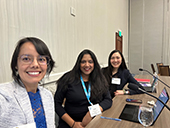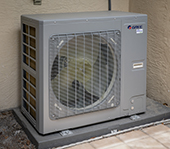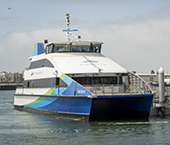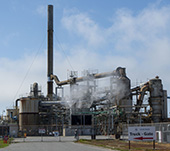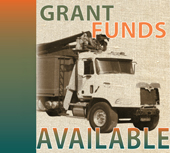|
|

|
|
|
|
August 2023 l Volume 2023-3
|
|
|
|
|
|
|
In this issue, you’ll find articles about the Air District’s publication of a first-in-California Environmental Justice Guidance chapter in the agency’s updated CEQA Guidelines, the Climate Tech Finance program’s funding of a next-generation battery maker and the inaugural meeting of the Implementation Working Group for the Building Appliance Rule Amendments. Other articles cover an Air District-funded clean ferry project in San Francisco, a penalty action against Chemtrade and the agency’s push for funding from a recent fine to be used for local health initiatives. The Air District Board Chair’s statement regarding the recent appointment of the COP28 president is also featured, and current grant opportunities are summarized.
|
|
|
|
|
|
|
|
|
|
|
|
|
|
Air District Publishes First-of-Its-Kind Environmental Justice Guidance
|
|
| | |
|
The Air District has published an environmental justice chapter, "Best Practices for Centering Environmental Justice, Health, and Equity," in the agency’s recently updated California Environmental Quality Act, or CEQA, Air Quality Guidelines. CEQA is a state law that generally requires government agencies to inform decision makers and the public about the potential environmental impacts of residential, commercial, industrial and other projects, and to reduce those environmental impacts to the extent feasible.
The environmental justice chapter in the Air District’s 2022 CEQA Guidelines – the first of its kind to be published in California – recognizes the policy imperative to help address long-standing and emerging inequities in the siting, design and development of potential sources of pollution. Apart from mitigating the impacts of pollution, this guidance will promote meaningful participation of community members in all phases of the environmental and land use decision making process.
Air District staff presented the new chapter to environmental professionals throughout the state on April 25, at the 2023 Association of Environmental Professionals Conference. Other agencies in California are encouraged to utilize the guidance document to center environmental justice, health and equity when evaluating projects under CEQA.
|
|
|
|
|
|
|
|
|
|
|
|
Air District’s Climate Tech Finance Program Funds Next-Gen Battery Maker in California to Propel the Clean Energy Transition
|
|
| | |
|
The Air District has awarded a loan guarantee to SPARKZ, a next-generation battery manufacturer re-engineering the battery supply chain in the United States. The company’s energy storage solution reduces the cost of domestic lithium battery production by eliminating the cobalt and nickel traditionally used in their manufacturing. The pioneering process developed by SPARKZ would lower the cost of lithium-ion batteries, remove environmental concerns around mining cobalt and reduce constrictions created by a foreign supply chain.
This loan guarantee is the most recent project under the Air District’s Climate Tech Finance program. In partnership with the California Infrastructure and Economic Development Bank and the Northern California Financial Development Corporation, the Climate Tech Finance team led a technology qualification, social equity impact and greenhouse gas analysis that deemed SPARKZ eligible for a multimillion-dollar loan guarantee. This loan guarantee supported SPARKZ in securing a line of credit with East West Bank.
The core value of the Climate Tech Finance program is to support innovative climate projects. The Air District’s greenhouse gas analysis ensures that new technologies will reduce short- and long-term greenhouse gas emissions.
The Climate Tech Finance loan guarantee provides a credit enhancement that supports SPARKZ’s manufacturing to meet growing demand from customers. SPARKZ batteries are estimated to reduce 1,200 metric tons of carbon dioxide equivalent emissions per year in California by replacing diesel school and transit buses with electric buses and using stationary batteries to reduce the load on the power grid.
|
|
|
|
|
|
|
|
|
|
|
|
Air District Holds Kick-Off Meeting of Implementation Working Group for Recently Adopted Building Appliance Rule Amendments
|
|
| | |
|
On May 23, the Air District convened its first Implementation Working Group meeting to discuss the equitable implementation of rules impacting nitrogen oxides emissions from natural gas-fired space and water heating appliances. On March 15, the Air District adopted amendments to Rule 9-4: Nitrogen Oxides from Fan Type Residential Central Furnaces and Rule 9-6: Nitrogen Oxides Emissions from Natural Gas-Fired Boilers and Water Heaters. These rules govern point of sale emission standards for small, typically residential and commercial, water and space heating systems.
Space and water-heating appliances generate a large portion of nitrogen oxide, or NOx, emissions from sources in the Bay Area. NOx is formed during natural gas combustion when ambient nitrogen and oxygen combine at high temperatures. The amendments will substantially reduce NOx emissions from these appliances, as well as secondary particulate matter formation. The implementation of these rule amendments will be a multiyear effort, spanning from 2024 to 2031.
As part of the recent amendments, the Air District committed to convene the Implementation Working Group, or IWG. The IWG is comprised of over 40 invited stakeholders representing a variety of stakeholder segments.
The purpose of the IWG is to provide input to Air District staff’s periodic reports to the Board of Directors on the implementation of the Building Appliances Rules, and to provide Air District staff with insights on the technical readiness of the market and the equitable transition to compliant appliances, to not unduly burden any income class or professional group. The IWG will provide a forum for invited members to discuss technical and equity aspects of implementing the Building Appliances Rules.
The first IWG meeting took place on May 23. The objectives of the meeting were to:
- Provide orientation presentation on Rules 9-4 and 9-6
- Provide overview of Working Group purpose and charter
- Confirm common understanding and commitment to charter guidelines and principles
- Provide opportunity for break-out discussions
- Identify next steps for confirming Subcommittee and Steering Committee membership
IWG meetings will be held on a quarterly basis and notifications will be sent out prior to each meeting. For more information, view the Building Appliance Rules web page.
|
|
|
|
|
|
|
|
|
|
|
|
Agencies Celebrate Completion of SF Bay Ferry Clean Air Conversion Project
|
|
| | |
|
In May, the San Francisco Bay Area Water Emergency Transportation Authority, or WETA, and the Air District announced that WETA’s Gemini Class Clean Air Conversion Project has been completed, resulting in a substantial decrease in air pollution emissions from four San Francisco Bay Ferry vessels serving Oakland, Alameda and Richmond. WETA already operates the cleanest ferry fleet in the country, and in September 2021, the Air District's Board of Directors continued that progress by approving a $5.5 million project to upgrade the engines and reduce emissions on the agency’s four Gemini-class vessels. The conversion to cleaner engines was completed over the course of 2022 and early 2023 at JT Marine in Vancouver, Wash.
Funding for the Gemini class project came from the Air District’s Carl Moyer Grant Program and proceeds from the Alameda County Transportation Commission’s sales tax Measure BB.
The four vessels were built with U.S. Environmental Protection Agency Tier 2 engines about 15 years ago. The conversion project replaced those engines with U.S. EPA Tier 4 certified engines, the cleanest available. Nitrogen oxide and hydrocarbon emissions are 73 percent lower and particulate matter emissions are 80 percent lower on each of the four vessels.
The project continues work that WETA started in 2019 when the agency built the nation’s first high-speed passenger ferry with Tier 4 certified engines. Today, 12 of the 16 ferries in the San Francisco Bay Ferry fleet are powered by Tier 4 engines, making it the cleanest high-speed, high-capacity passenger ferry fleet in the nation.
|
|
|
|
|
|
|
|
|
|
|
|
Air District Fines Chemtrade $1.15 Million for Air Quality Violations
|
|
| | |
|
On July 27, the Air District announced that it had fined Chemtrade $1,150,000 for air quality violations at its sulfuric acid manufacturing plant in Richmond. The penalty resolves seven notices of violation issued to Chemtrade for violations that occurred at its Richmond facility. The violations primarily involved Chemtrade’s continuous emissions monitoring system, which measures the plant’s sulfur dioxide emissions to ensure that the facility complies with permit limits. Chemtrade failed to properly calibrate, operate and maintain this monitoring system over an eight-year period. This caused the monitoring system to under-report sulfur dioxide emissions by an estimated 33 percent per year on average.
Sulfur dioxide can have adverse impacts on the respiratory system and contributes to acid rain. The Air District’s audit did not find evidence that Chemtrade’s sulfur dioxide emissions exceeded the facility’s permit limits. But it did find that Chemtrade’s monitoring system was unable to reliably monitor the extent of the plant’s emissions.
The Air District’s Hearing Board previously issued an abatement order that required Chemtrade to address the problems with its monitoring system in April 2022. The assessment of this $1,150,000 fine adds a monetary penalty to that enforcement response. Agency staff will recommend that the Air District’s Board of Directors consider using a portion of these penalty funds in the Richmond community for projects to improve air quality.
In addition to the problems with monitoring system, the $1,150,000 penalty also covers violations for failure to use required abatement equipment to prevent emissions while unloading railcars at the facility; failure to properly start up the sulfuric acid plant, resulting in a visible yellow-brown plume from its main exhaust stack; and failure to report required information regarding these violations. All the violations that led to this settlement have been corrected.
The Air District issues Notices of Violation when facilities violate a specific air quality regulation or rule. Violators are generally required to respond to the notice within 10 days and submit a description of the actions they will take to correct the problem. These actions can include shutting down certain operations immediately or changing operations or equipment to come into compliance.
|
|
|
|
|
|
|
|
|
|
|
|
Contra Costa County and the Air District Push for At Least 40 Percent of Tesoro Settlement Funds to Stay Local
|
|
| | |
|
In partnership with the Air District, Contra Costa County Board of Supervisors Chair John Gioia sent a letter in June to the U.S. Department of Justice requesting that at least 40 percent of a recent penalty against Tesoro Refining & Marketing Company be used for local health initiatives. The DOJ and the U.S. Environmental Protection Agency assessed the $27.5 million penalty in April 2023 after Tesoro violated a previous court order requiring it to reduce air pollution at its local petroleum refinery. According to the settlement, Tesoro failed to limit air emissions of nitrogen oxides, a pollutant that contributes to smog and particulate matter.
The joint funding proposals supported by the Air District and Contra Costa County include:
- Expanding the In-home Asthma Mitigation and Energy Efficiency Program
- Distributing portable air purifiers to homes
- Installing HVAC systems and extend county library hours to serve as cooling centers
- Installing HVAC systems and portable air purifiers in schools
- Sheltering unhoused during extreme weather events, industrial fires or releases
- Strengthening community outreach for air quality and hazardous materials awareness and response to releases
- Supporting the Air District and Contra Costa Health with equipment or training
|
|
|
|
|
|
|
|
|
|
|
|
Air District Board Chair Issues Statement Opposing the Selection of COP28 President with Ties to Fossil Fuel Industry
|
|
| | |
|
In May, John J. Bauters, chair of the Air District Board of Directors, offered a statement about the selection of an oil company executive as president of the COP28 climate summit. “I must express my deep concerns about the selection of Sultan Al Jaber as president of the COP28 climate summit. As board chair of the nation’s first and oldest regional air pollution control agency, I will not remain silent about a decision that undermines the very essence of climate leadership, environmental stewardship and is an affront to the marginalized voices across the globe fighting not only climate change, but in many cases, for their own existence.
The face of COP28 must not be that of an oil company executive. The global discussion that occurs at the COP must be authentic, honest and sincere. A critical gathering of this nature must not be co-opted by the fossil fuel industry interests — the same actors who have externalized the incredible environmental and public health harms that COP28 seeks to rectify.
At the Bay Area Air Quality Management District, we are working to center our communities in everything we do. As a person with privilege, it is morally imperative that my voice be loud and clear: women, black, brown, and indigenous people, children in developing countries, the global youth movement, and lower-income communities that have been historically marginalized and disproportionately impacted by climate change are the voices that must lead us. It is only through their experiences and perspectives that we can truly grasp the urgency of the situation and move toward meaningful, collective action.
I have been a faithful supporter and participant in the COP climate conferences over recent years, presenting in conference sessions at both COP26 in Glasgow, and COP27 in Sharm el-Sheikh. Today, I am forced to seriously reconsider my commitment to COP as the appropriate venue and vehicle for making meaningful progress if a change in leadership does not occur. COP28 should not become an opportunity for those who have monetized the environment to undermine climate action by capturing a forum intended for environmental stewardship.
I call on leaders across California to join me in demanding change. Together, we must ensure that COP28 is a beacon of hope and progress, standing firm against the forces that perpetuate harm. Our future, our common human existence and health of our planet depend on it.”
|
|
|
|
|
|
|
|
|
|
|
|
Air District Offers Millions in Grants
|
|
| | |
|
The Air District administers a number of grant funding programs that offer incentives for clean air projects. Grant Funding for Clean Air Projects
Grant programs for Bay Area businesses and public agencies:
- Applications are currently being accepted for projects that will install and operate electric charging infrastructure to support zero-emission heavy- and medium-duty vehicles and equipment in the Bay Area. Applications are due on September 19 and applications that meet the basic eligibility requirements will be scored and ranked based on the evaluation criteria.
At least 80 percent of the total funds will be awarded to projects that reduce emissions in disadvantaged and low-income communities, including communities that have been identified through the AB 617 process, i.e., West Oakland and East Oakland in Alameda County, Richmond/San Pablo in Contra Costa County, and Bayview-Hunters Point in San Francisco.
Interested applicants can find out more and apply at: https://www.baaqmd.gov/funding-and-incentives/apply-for-funding
- A solicitation to accept applications for replacing heavy-duty equipment that reduce toxic air emissions and ozone-forming pollutants through the scrap and replacement of older, high-polluting vehicles and equipment is scheduled to open this fall. Eligible project categories include upgrades or replacements of:
- School buses, transit buses, and shuttles
- Heavy-duty trucks, emergency vehicles, and transportation refrigeration units (TRUs)
- Off-road construction, industrial, and agricultural equipment, for example: dozers, forklifts, tractors, ag pumps, and portable or stationary engines
- Off-road port and freight equipment, including cargo-handling equipment and airport ground support equipment
- Marine vessel engines and locomotives
- Charging and refueling infrastructure projects that support heavy-duty zero-emission vehicles, including battery-electric and hydrogen fuel-cell vehicles, are also eligible
Applications will be accepted on a first-come, first-served basis, with a portion of available funding reserved for projects that reduce emissions in disadvantaged and low-income areas, and areas that are most highly impacted by air pollution, including the AB 617-identified communities of West Oakland, East Oakland, Richmond-San Pablo, and Bayview Hunters Point/Southeast San Francisco. Apply at www.baaqmd.gov/funding-and-incentives.
Projects are funded by the Carl Moyer Program, Community Air Protection Program, Transportation Fund for Clean Air, Goods Movement, Mobile Source Incentive Fund, and Funding Agricultural Replacement Measures for Emission Reductions (FARMER) program.
- Climate Tech Finance Loan Guarantee Program is available to support the development and purchase of climate technologies for small businesses in California. Climate entrepreneurs can apply for loan guarantees up to 80 percent of the loan principal or $5 million, whichever is less, to accelerate the growth and impact of their businesses. This program is open and accepting applications now. https://ctf.baaqmd.gov/
Grant programs available to Bay Area residents:
- Passenger Car and Light-Duty Truck Retirement – The Vehicle Buy Back Program pays Bay Area residents $1,200 per vehicle to turn in their operable, registered, model year 1998 and older passenger car or light-duty truck for scrapping. www.baaqmd.gov/vbb
- Clean Cars for All Program, Light-Duty Vehicle Replacement – The Clean Cars for All Program is open to income-qualified Bay Area residents in qualifying zip codes. The program provides grants of up to $9,500 to retire older, high-polluting vehicles and replace them with a new or used conventional hybrid, plug-in hybrid, fuel-cell, or electric vehicle. Residents that don’t want to purchase a replacement vehicle can receive $7,500 towards alternative mobility options (e.g. public transit or electric bicycles). www.baaqmd.gov/cleancarsforall
Other state-wide grant programs funded by Volkswagen NOx Mitigation Trust (only the first is administered by the Bay Area Air District):
- VW Zero-Emission Freight and Marine Program – Funding is available statewide to accelerate the replacement of older, higher polluting diesel engines with zero-emission technology. Approximately $25 million in Volkswagen Environmental Mitigation Trust funding is available for projects that do one or more of the following:
- Scrap combustion-based airport ground support equipment and replace with all-electric,
- Scrap combustion-based heavy-lift forklifts (> 8,000 pounds of lift capacity) and replace with all-electric,
- Scrap combustion-based port cargo-handling equipment and replace with all-electric,
- Scrap combustion-based ferry, tugboat, or towboat engines and replace with all-electric, and/or
- Install portside shore power systems at berths for use by unregulated oceangoing vessels.
75 percent of funding will be awarded to projects that reduce emissions in California’s disadvantaged and low-income communities.
This solicitation is open and accepting applications on a first-come, first-served basis until early November 2023. Recent updates to the program eligibility requirements include the removal of the previous static funding cap and an increase to the cost-effectiveness limit for eligible projects. https://www.californiavwtrust.org/zero-freight-marine/
- VW Combustion Freight and Marine Projects – Funding is available statewide to accelerate the replacement of older, higher polluting diesel engines with the cleanest available technologies. Equipment eligible for replacement includes Class 7 and 8 freight trucks (including waste haulers, dump trucks, and concrete mixers) or their engines (2012 model year and older) that are compliant with current regulations; freight switcher locomotives or their engines (pre-Tier 1); and ferry, tugboat, and towboat engines (pre-Tier 3). This solicitation is open and accepting applications on a first-come, first-served basis until all funds are fully allocated. https://xappprod.aqmd.gov/vw/combustion.html
- VW Zero-Emission Class 8 Freight and Port Drayage Trucks - This category is intended to support the expansion of zero-emission truck availability in the heaviest weight class. Vehicles eligible for replacement include Class 8 freight trucks (including drayage trucks, waste haulers, dump trucks, and concrete mixers) or their engines (2012 model year and older). This solicitation is open and accepting applications on a first-come, first-served basis until all funds are fully allocated. https://xappprod.aqmd.gov/vw/zero-emission.html
- VW Zero-Emission Transit and Shuttle Buses – The second installment of VW funding is available to owners of bus fleets that operate in California to support early adoption of zero-emission bus technologies to reduce harmful exposure for the state’s most sensitive populations. This program is administered by the San Joaquin Valley Air Pollution Control District. The zero-emission school bus bin is now oversubscribed. This solicitation is open and accepting applications for transit and shuttle buses on a first-come, first-served basis until all funds are fully allocated. http://vwbusmoney.valleyair.org/
|
|
|
|
|
|
|
|
|
|


